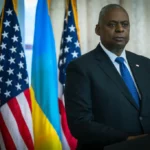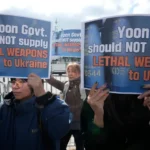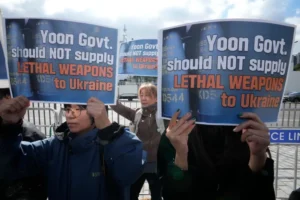The coup in Niger is injecting fresh tension into the France-U.S. alliance.
The two countries are at odds over how to respond to the ouster of the West African country’s president in July. France is refusing to diplomatically engage with the junta and strongly supports a regional body that has threatened military intervention. The U.S. has dispatched an envoy to meet with the junta leadership and held back from officially declaring the takeover a coup — insisting there’s still a negotiated way to restore democracy.
French officials also support a peaceful resolution, but they are bristling at the U.S. approach, saying engaging the junta empowers it.
“Perhaps in order to avoid bloodshed, the U.S. was quickly keen to talk to the putschists. Maybe the better reaction should’ve been to put some conditions or guarantees before opening those channels,” said a French official familiar with the situation in Niger. The official, like others who spoke for this story, was granted anonymity to discuss a sensitive diplomatic matter.
The situation suggests a shifting balance of power in the region and underscores the differences between Paris and Washington’s interests in the country. The U.S., which uses Niger as a base for counterterrorism operations, may also believe it has more leverage than France, not least due to Paris’ baggage as its former colonizer.
Some former U.S. officials argue that France’s unhappiness with the U.S. approach is due in part to its agitation at losing one of its last strategic footholds in the West African Sahel, where other coups have already forced it to withdraw troops elsewhere. France has refused a request by the junta in Niger that it withdraw troops from the country.
“The stakes for France in Niger are much higher than for Washington … It’s a psychological and strategic defeat for France,” said Cameron Hudson, a former White House National Security Council official focused on Africa.
In West Africa, France is accustomed to seeing other world powers follow its lead, or at least its guidance. That’s not happening in this case.
Acting Deputy U.S. Secretary of State Victoria Nuland, on a lightning visit to Niger, met with coup representatives on Aug. 7 and urged them to reverse their actions. But she was denied a meeting with the deposed president, Mohamed Bazoum, and she acknowledged afterward that the junta appeared unwilling to reverse its anti-democratic moves.
French officials pointed to that as an example of being too quick to engage.
While France and the U.S. remain closely aligned on a range of topics, including Russia’s aggression against Ukraine, several points of tensions have emerged between the “oldest allies” in recent years. They include differences over a security partnership among Australia, the U.S. and the United Kingdom, relations with China, and America’s Inflation Reduction Act, which Europeans fear will siphon investment away from Europe.
A U.S. official familiar with the issue acknowledged that some allies were unhappy with Nuland’s trip but would not say which allies or detail their concerns.
Nonetheless, the official defended the attempt to engage the coup leaders.
“The window of opportunity is closing,” the U.S. official said. “Do you let that window seal shut? Or inject some degree of flexibility?”
Ali El Husseini, an American with connections to the junta, said Niger’s new military rulers do not trust the French, not least because French officials are acting like they “don’t exist.”
They blame the French for the pressure they are feeling from surrounding countries, as well as what they see as corruption in Niger. They are unlikely to allow Bazoum back in charge, blaming him for much of that corruption as well, El Husseini said. But they are willing to engage with the United States, which they see as being less condescending, he said.
French officials maintain they are not engaging with the coup leaders to show their support for Bazoum. He is under house arrest but has managed to speak with foreign officials, including Secretary of State Antony Blinken, and publish appeals for help from the international community.
Source : Politico












Add Comment